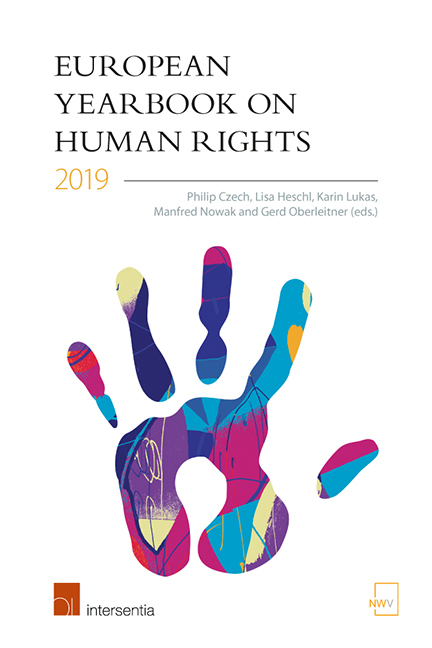Editors’ Preface
Published online by Cambridge University Press: 24 January 2020
Summary
Dear readers,
The year 2018 has seen several human rights milestone events worldwide: at the international level the 70th anniversary of the Universal Declaration of Human Rights was widely celebrated, as was the 25th birthday of the Vienna Declaration and Programme of Action, the result of the World Conference on Human Rights in Vienna 1993. But also at the national, the Austrian level (the European Yearbook on Human Rights (EYHR) is edited by the three major human rights institutes in Austria) several human rights jubilees have shaped the academic human rights discourse in 2018: Austria ratified the European Convention on Human Rights in 1958 (60 years); the two Covenants on Civil and Political and Economic, Social and Cultural Rights in 1978 (40 years); and the UN Convention on the Rights of Persons with Disabilities in 2008 (10 years). But despite all these long-standing human rights commitments which the international community and states have celebrated in 2018, human rights are still a topic of concern and their violation remains widespread despite the effusive affirmations by world leaders to respect, protect and promote human rights. The EYHR 2019 thus aims to continue to contribute to the academic debate on human rights and to raise awareness for topical human rights issues in Europe and beyond.
The editorial team – composed of representatives of the European Training and Research Centre on Human Rights and Democracy of the University of Graz (UNI-ETC), the Ludwig Boltzmann Institute of Human Rights Vienna (BIM), the Austrian Human Rights Institute of the University of Salzburg and the Global Campus of Human Rights Venice – when selecting the contributions paid particular attention to the highest academic standard, gender balance and a concerted mix of contributions by well-established academics and ‘newcomers’ in the field of human rights research. As in the last years the EYHR 2019 remains structured around current human rights challenges the European institutions – i.e. the European Union (EU), the Council of Europe (CoE), and the Organization for Security and Co-operation in Europe (OSCE) – are currently facing. This year we introduced a new part dedicated to reports by special procedures of international organisations, reflecting the important work which is done in the field of monitoring human rights violations worldwide. Topical human rights issues beyond European borders are further addressed in the part ‘Others’.
- Type
- Chapter
- Information
- European Yearbook on Human Rights 2019 , pp. vii - xiiPublisher: IntersentiaPrint publication year: 2019



